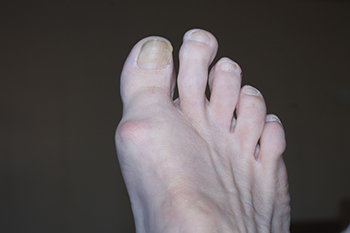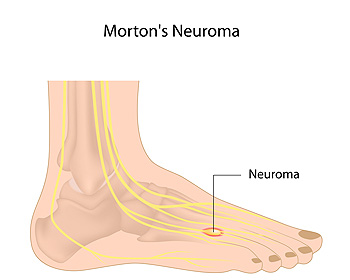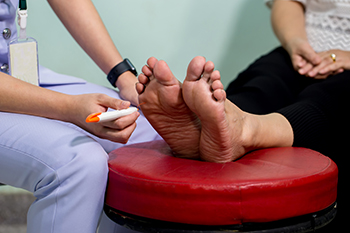Items filtered by date: September 2023
Causes and Solutions for Second Toe Pain

Second toe pain can be a bothersome and discomforting issue, impacting your daily activities and quality of life. Understanding the potential causes and effective treatments is crucial for finding relief and maintaining optimal foot health. One common culprit of second toe pain is wearing improperly fitting shoes. Tight, narrow, or pointy shoes can compress the toes, leading to discomfort and deformities such as hammertoes. High heels, which force excessive weight onto the toes, can exacerbate this problem. Another frequent cause is overuse or repetitive stress, often seen in athletes or individuals engaged in activities that involve pushing off with the toes. This can lead to conditions that can include metatarsalgia or stress fractures. To address second toe pain, begin by wearing comfortable, properly fitting shoes with adequate toe room. Wearing custom orthotics can provide additional support and alleviate pressure. Rest, and taking over-the-counter pain relievers can help manage acute pain, and exercises may be beneficial for chronic issues. If second toe pain persists or worsens, it is suggested that you consult a podiatrist for a proper diagnosis and tailored treatment plan.
Toe pain can disrupt your daily activities. If you have any concerns, contact Harvey Jacobs, DPM of Quality Foot Care Center. Our doctor can provide the care you need to keep you pain-free and on your feet.
What Causes Toe Pain?
Most severe toe pain is caused due to a sports injury, trauma from dropping something heavy on the toe, or bumping into something rigid. Other problems can develop over time for various reasons.
Toe pain can be caused by one or more ailments. The most common include:
- Trauma
- Sports injury
- Wearing shoes that are too tight
- Arthritis
- Gout
- Corns and calluses
- Hammertoe
- Bunions
- Blisters
- Ingrown toenails
- Sprains
- Fractures (broken bones)
- Dislocations
When to See a Podiatrist
- Severe pain
- Persistent pain that lasts more than a week
- Signs of infection
- Continued swelling
- Pain that prevents walking
Diagnosis
In many cases the cause of toe pain is obvious, but in others, a podiatrist may want to use more advanced methods to determine the problem. These can range from simple visual inspections and sensation tests to X-rays and MRI scans. Prior medical history, family medical history, and any recent physical traumatic events will all be taken into consideration for a proper diagnosis.
Treatment
Treatments for toe pain and injuries vary and may include shoe inserts, padding, taping, medicines, injections, and in some cases, surgery. If you believe that you have broken a toe, please see a podiatrist as soon as possible.
If you have any questions please feel free to contact our office located in Somerset, NJ . We offer the newest diagnostic tools and technology to treat your foot and ankle needs.
Common Foot Problems in Children

Children's feet are essential for their overall health and development. However, various foot problems can affect children as they grow. Flat feet, or pes planus, is a common condition where the arches on the inside of the feet do not develop fully, making the entire sole touch the ground. While this is normal in infants, it should resolve as they age. Ingrown toenails can cause pain, redness, and swelling, often the result of improper nail trimming or tight shoes. Proper nail care and footwear are key to preventing this issue. Sever's disease, medically termed calcaneal apophysitis, is common in active children between the ages of 8 and 14. It affects the growth plate in the heel and causes heel pain, especially during physical activities. Deformities, such as clubfoot, curly toes or overlapping toes, can be present from birth or develop later. Early intervention can help correct these deformities. Parents may wish to regularly inspect their children's feet and seek the help of a podiatrist for any of these common foot problems.
The health of a child’s feet is vital to their overall well-being. If you have any questions regarding foot health, contact Harvey Jacobs, DPM of Quality Foot Care Center. Our doctor can provide the care you need to keep you pain-free and on your feet.
Tips for Keeping Children's Feet Healthy
- Make sure their shoes fit properly
- Look for any signs of in-toeing or out-toeing
- Check to see if they have Clubfoot (condition that affects your child’s foot and ankle, twisting the heel and toes inward) which is one of the most common nonmajor birth defects.
- Lightly cover your baby’s feet (Tight covers may keep your baby from moving their feet freely, and could prevent normal development)
- Allow your toddler to go shoeless (Shoes can be restricting for a young child’s foot)
- Cut toenails straight across to avoid ingrown toenails
- Keep your child’s foot clean and dry
- Cover cuts and scrapes. Wash any scratches with soap and water and cover them with a bandage until they’ve healed.
If you have any questions, please feel free to contact our office located in Somerset, NJ . We offer the newest diagnostic and treatment technologies for all your foot care needs.
Gout Pain Can Be Managed
Causes and Symptoms of Morton’s Neuroma

Morton's neuroma, a painful condition affecting the feet, can develop due to a combination of factors. One primary factor is biomechanical issues within the feet, such as having flat feet or high arches. These structural variations can place excessive stress on the toe joints, leading to repeated irritation of the nerve. Tight calf muscles, which limits ankle movement, are another contributor to this condition. When the ankle's range of motion is restricted, it can result in increased pressure on the balls of the feet, further aggravating the situation. Additionally, footwear choices play a significant role in developing Morton’s neuroma. Wearing narrow, high heeled or tight fitting shoes compresses the nerves and puts pressure on the forefoot. Some patients report a persistent aching or burning sensation, frequently occurring between the third and fourth toes. This discomfort is often accompanied by sharp, shooting pains in the ball of the foot, which can extend into the toes and create additional discomfort. Some patients liken the sensation to having a foreign object such as a pebble or stone, trapped inside their shoe. Tingling and pricking sensations in the toes are also prevalent and contribute to the overall discomfort associated with Morton's neuroma. If you believe you may have Morton’s neuroma, it is suggested that you make an appointment with a podiatrist.
Morton’s neuroma is a very uncomfortable condition to live with. If you think you have Morton’s neuroma, contact Harvey Jacobs, DPM of Quality Foot Care Center. Our doctor will attend to all of your foot care needs and answer any of your related questions.
Morton’s Neuroma
Morton's neuroma is a painful foot condition that commonly affects the areas between the second and third or third and fourth toe, although other areas of the foot are also susceptible. Morton’s neuroma is caused by an inflamed nerve in the foot that is being squeezed and aggravated by surrounding bones.
What Increases the Chances of Having Morton’s Neuroma?
- Ill-fitting high heels or shoes that add pressure to the toe or foot
- Jogging, running or any sport that involves constant impact to the foot
- Flat feet, bunions, and any other foot deformities
Morton’s neuroma is a very treatable condition. Orthotics and shoe inserts can often be used to alleviate the pain on the forefront of the feet. In more severe cases, corticosteroids can also be prescribed. In order to figure out the best treatment for your neuroma, it’s recommended to seek the care of a podiatrist who can diagnose your condition and provide different treatment options.
If you have any questions, please feel free to contact our office located in Somerset, NJ . We offer the newest diagnostic and treatment technologies for all your foot care needs.
Foot Problems Caused by Diabetes

For anyone living with diabetes, understanding potential foot problems and how to address them is of great importance. Conditions resulting from diabetes that can lead to significant foot issues are loss of protective sensation, also known as LOPS, and peripheral artery disease, or PAD. The former refers to the loss of feeling in the feet. This loss of sensation can prevent you from noticing discomfort, such as a pebble in your shoe or a cut or blister on your foot. Consequently, you might not realize when your skin is being injured, which increases the risk of infected sores. Ill-fitting shoes, foreign objects in shoes, sharp items on the ground, and extreme temperatures can all cause harm. Equally problematic is peripheral artery disease, which reduces blood flow to the feet. This can lead to pain, delayed wound healing, and the formation of foot ulcers. Individuals with PAD are at an increased risk of limb loss unless immediate action is taken. Regularly checking and safeguarding your feet, wearing well-fitting shoes, and seeking professional nail care are necessary steps to be taken daily. For help with foot issues caused by diabetes, it is suggested that you have a podiatrist on your team of medical professionals.
Diabetic foot care is important in preventing foot ailments such as ulcers. If you are suffering from diabetes or have any other concerns about your feet, contact Harvey Jacobs, DPM from Quality Foot Care Center. Our doctor can provide the care you need to keep you pain-free and on your feet.
Diabetic Foot Care
Diabetes affects millions of people every year. The condition can damage blood vessels in many parts of the body, especially the feet. Because of this, taking care of your feet is essential if you have diabetes, and having a podiatrist help monitor your foot health is highly recommended.
The Importance of Caring for Your Feet
- Routinely inspect your feet for bruises or sores.
- Wear socks that fit your feet comfortably.
- Wear comfortable shoes that provide adequate support.
Patients with diabetes should have their doctor monitor their blood levels, as blood sugar levels play such a huge role in diabetic care. Monitoring these levels on a regular basis is highly advised.
It is always best to inform your healthcare professional of any concerns you may have regarding your feet, especially for diabetic patients. Early treatment and routine foot examinations are keys to maintaining proper health, especially because severe complications can arise if proper treatment is not applied.
If you have any questions please feel free to contact our office located in Somerset, NJ . We offer the newest diagnostic and treatment technologies for all your foot and ankle needs.

